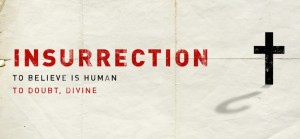 Yesterday I wrote about the novels I'm eager to read this fall.
Yesterday I wrote about the novels I'm eager to read this fall.
And while, yes, autumn is my season for fiction, there is also a work of nonfiction being released next week about which I am equally excited.
The book is called Insurrection: To Believe is Human to Doubt, Divine, and it's by Christian thinker/philosopher Peter Rollins.
I first became aware of Rollins through Besides the Bible, a book to which we both contributed essays. After being impressed by his essay in BTB, I popped by his blog to have a quick look-see at what he was all about. I've been frequenting the blog ever since.
Last week, Rollins posted the introduction and first chapter of Insurrection on his website, and I devoured it. He really is one of the most challenging thinkers in the Christian world today.
(Read the April 2010 God's Politics post by Steve Holt about Rollins' 10-city, pre-Easter "Insurrection Tour," that brought the message that God is big enough to handle our doubts to pubs -- rather than churches -- HERE.)
In the opening portion of his book, Rollins wrestles with something I've thought about quite a bit in my life: the motivation behind desire.
In other words, Rollins asks whether we desire something because we desire it, or whether we desire something because we desire others to know about what we've done.
Rollins uses the example of Aaron Sorkin's film The Social Network to frame this idea. He points out how everything Jesse Eisenberg (Mark Zuckerburg) did -- everything he created along with all of its attendant success -- happened because he wanted to impress a girl who had dumped him.
I remember when I first was confronted with this philosophical idea. I was fifteen, in my old jeep, driving down Westwood Avenue in High Point, thinking of something I'd recently done, when suddenly, a thought occurred to me: Did I do this thing because I really wanted to (as I had originally thought), or did I do it because I wanted my friends and people at school to know I did it?
Though only 15 at the time, I became haunted by this thought, because I suddenly knew in my heart that I cared more about what people thought than I cared about what I actually did.
Rollins says of the people whom we want to impress: "The spectator is often little more than an image we have in our mind (for instance, this person could be long dead in reality), but he or she is the one who invests our fantasies and achievements with their excessive pleasures (i.e. the pleasure we get that is beyond the mere satisfaction of basic needs)."
I concur wholeheartedly with what he is suggesting.
Rollins is saying that, as we move through our formative years, we naturally want to impress certain people. Most often these people are our parents and family members. Or perhaps they may be first crushes, or first lovers, or people who first inflicted pain upon us.
Then, as we grow older, we go through our lives doing things, accomplishing things, all the while unaware that we are, in the present, trying to impress people from our past.
This notion is one of the central themes of F. Scott Fitzgerald's The Great Gatsby, and it is why he concludes his masterpiece like this:
"And so we beat on, boats against the current, borne back ceaselessly into the past."
Here, Fitzgerald is saying that everything we do-that all of the hardships we encounter, that all of the obstacles we overcome, that all of the successes we have-are mere exercises in trying to recreate our pasts.
I think Fitzgerald was right.
And based on the introduction and first chapter of his new book, I think Pete Rollins agrees, too.
 Austin Carty is a writer and speaker from central North Carolina. He is the author of High Points and Lows: Life, Faith, and Figuring It All Out, and he blogs daily at www.austincarty.com,
Austin Carty is a writer and speaker from central North Carolina. He is the author of High Points and Lows: Life, Faith, and Figuring It All Out, and he blogs daily at www.austincarty.com,
Got something to say about what you're reading? We value your feedback!